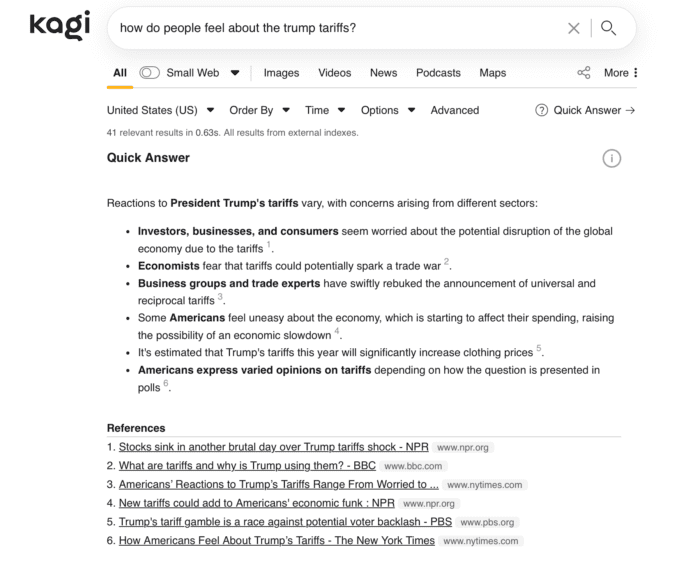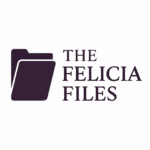
‘Enough Is Enough’: Dems Aim to Force GOP on Record as Trump Tariffs Wreak Havoc | Common Dreams
April 9, 2025
North Carolina Is Asking People to Vote According to Rules the State Hasn’t Set
April 9, 2025Eight years ago, a friend and I drove from Buffalo to Los Angeles in a 14-year-old Audi station wagon we nicknamed Gerhardt. It was an imperfect car: The brakes didn’t work until the day before we left and the check engine light stayed on until we hit the Grand Canyon, at which point one of the headlamps stopped working. And yet, as we passed a Greyhound bus somewhere between Ohio and Nebraska, I found myself grateful not to be inside it; far better, I reasoned, to choose my route and stops than have them chosen for me, and to be sitting next to one of my closest friends rather than a stranger.
Lately, I’ve been thinking about the internet in terms of Gerhardt vs. Greyhound. The algorithms are driving the bus and the windows have been replaced with AI describing the view outside, which may sometimes be accurate but occasionally also drops Mount Rushmore into the Illinois countryside. This is especially true on Google, which has been overhauling search to emphasize AI summaries and keep you on its own websites; an upcoming AI mode will prioritize AI even further so that users don’t have to go through the hassle of clicking on links and reading websites on their own.
There are many issues with that idea, but my most basic issue is that I quite like browsing the web (how do you do fellow kids dot gif, etc etc). I’m by no means the first to have this thought; variations of “why Google is worse now” have practically become their own headline subgenre, and Cory Doctorow’s 2022 essay coining the term “enshittification” gave us all a term to describe what we’ve been feeling over the past few years. Still, a few weeks ago, inspired in part by The Verge’s David Pierce, I signed up for Kagi, a search engine with the following premise: It will fix search for you, providing you an interface very much like the Google of yore, but you have to pay $10 a month for it ($5 if you’re okay being limited to 300 searches a month, or $25 if you’d like it to plug into premium AI models like Claude 3.7 Sonnet or GPT4o).
After testing Kagi both as my everyday search engine and as a research tool for a working journalist, I’ve been delighted to find that it’s the search engine equivalent of a Honda Civic: reliable, unobtrusive, and able to get you where you need to go. Once I set Kagi up as my default search engine — which involved installing extensions on my phone and laptop — and got past the initial hump of unfamiliarity (Kagi lacks some of the polished bells and whistles of Google), I even found Kagi’s ideas for personalizing search to be quietly revolutionary.
Compared to the deteriorating state of Google, it’s a breath of fresh air. AI summaries only generate if I specifically click a “quick answer” button or end a query with a question mark, and those summaries are startlingly good at citations; each answer includes copious footnotes, which appear at the bottom as a list of links. There’s also an option to exclude AI-generated images from search results.
Kagi lets users customize their search experience in two primary ways: ranking domains and “lenses,” which filter results to only include specific sources. Ranking domains does what it says on the tin. Websites can be ranked higher or lower in search results, and users can even pin sites to the top of results or block them from showing up in results entirely. Kagi also has a domain leaderboard that shows how its users rank various sites; it seems Kagi users really don’t like Pinterest, Fox News, or Breitbart but are big fans of github, reddit, and Wikipedia.
Lenses appear in a list in the search bar, with a toggle allowing you to quickly switch on or off your most recent lens. The built-in “academic” lens, for example, limits results to academic journals and .edu domains, while the built-in “News360” lens brings links that “offer a 360 degree perspective on news impacting the globe” (that lens primarily brought up links from the AP, Al Jazeera, NPR, the South China Morning Post, and the Indian news outlet Firstpost). I live in Brooklyn, so I created a custom “NYC local” lens that limited results to a few favorite local outlets. The best analog I can think of is the custom feeds in Bluesky, which — with its highly customizable moderation tools and open-source framework — operates on similar ideas of personalized user experiences.

Searches on Kagi often surface auto-generated lists of links titled things like “listicles,” (which showed up when I was searching for product reviews) or “interesting news.” None of these are sponsored, and I generally came to trust that each link showed up just because Kagi, which draws results from a combination of trusted sources and its own index, determined they were actually relevant to my query. Both regular search and the news tab are great at handling timely topics, and I came to really appreciate the fact that Kagi has a dedicated podcasts tab, which feels like the antithesis of Google “short videos” tab.
Perhaps most surprising to me was the fact that Kagi’s results are finite: most searches bring 30 to 50 results by default, and clicking a “more results” button (no infinite scroll here) loads another page of results. But then the links just…end. There is no second “more results” button; Kagi’s philosophy is that users should be able to get what they need in the first page or two of results, and “if the user needs to go to page 17 to find what they were looking for, we have failed.” Queries with lenses turned usually only surface a handful of results.
This has its ups and downs. For the most part, this is how I and everyone else I know use search anyway. However, it did get me thinking of one site in particular: HouseFresh.
Last February, the independent air purifier review website HouseFresh posted a story (which Laura also wrote about) titled “How Google is killing independent sites like ours,” in which managing editor Gisele Navarro and founder and senior writer Danny Ashton wrote about how “big media publishers are inundating the web with subpar product recommendations you can’t trust.” Two months later, Navarro posted a follow-up about what would come next for the site (more content, essentially), after Google began shoving more direct shopping links into its search results and HouseFresh is getting ranked even lower. I was curious: does Kagi work better for HouseFresh than Google?
When I tried a search with all my filters turned off — no changes to website ranking and no lenses — HouseFresh was the 29th result for “best air purifier.” When I searched for “best air purifier to buy right now,” an exact headline on their site, it showed up 6th or 7th. But when I searched Kagi for “best budget air purifiers,” which Navarro writes has dropped from 2nd to 64th on Google, HouseFresh was the first link to show up after a carousel of forum discussions.
I am inclined to think of this as a good thing. HouseFresh conducts independent testing, and its articles are written by real people who have sunk money into the cost of buying and reviewing products; a sharp contrast to websites that rely on AI and (often fake) reviews from Amazon to juice SEO and revenue from affiliate links. HouseFresh also makes money off affiliate links (which they’re upfront about), and engages in SEO tricks of its own like updating article dates to make them seem more relevant to search engines, but I find myself more willing to give them a pass for those things. I’d rather have a weird, quirky internet built by a motley crew of humans getting rewarded for their work than one where AI siphons away both money and creativity.
So is Kagi the panacea we need for a broken internet? I’m not sure. There are, I imagine, good arguments against downranking or upranking sites that have something to do with each of us living in our own bubbles, but the algorithms that have come to dominate our lives elsewhere already do that for us anyway; on Kagi, meanwhile, creating a bubble requires user intent. For now, I’m happy just to feel like I have control over my experience of the internet again — on my browser, at least, I’m going where I want to go.
Great Job Neel Dhanesha & the Team @ Nieman Lab Source link for sharing this story.







